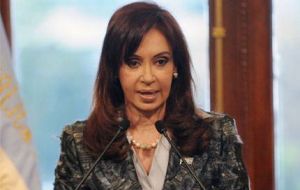MercoPress. South Atlantic News Agency
Argentina to pay sovereign debts in 2012 with 5.7bn from the Central bank
 Cheaper to pay debt with reserves than to borrow, President Cristina Kirchner
Cheaper to pay debt with reserves than to borrow, President Cristina Kirchner The Argentine government plans to trim its dependence on central bank reserves to pay debt next year after tapping savings to slow depreciation of the Peso, according to its draft 2012 budget.
The government aims to use 5.7 billion dollars in reserves to make debt payments in 2012, down from 7.5 billion this year, according to a copy of the budget posted on Congress’s website. Central bank reserves have tumbled 5.7% this year to 49.2 billion dollars while countries from Brazil to Mexico have boosted savings.
“We foresee the continuity of the fund to reduce debt as a way to ensure the government’s capacity to pay maturating debt even in adverse scenarios, without the need of alternatives that would cut the freedom of national economic policies,” the draft bill said.
President Cristina Fernandez has said it’s cheaper for South America’s second-biggest economy to pay debt with reserves than return to international debt markets for the first time in a decade. Argentine dollar bonds yield 10.9%, compared with yields of 4.8% and 4.5% for Brazilian and Mexican dollar bonds, respectively, according to JPMorgan Chase.
Argentina, which hasn’t sold debt abroad since 2001, also plans to buy back 14.3 billion Pesos (3.4 billion dollars) of debt in 2012 using government funds, according to the draft bill.
The use of reserves to pay debt may undermine the central bank’s capacity to manage the exchange rate if turbulence in global markets reduces dollar inflows to the country, said Daniel Volberg, an economist at Morgan Stanley in New York.
“If there’s enough income, it won’t be dangerous but it seems that the global environment won’t be very good,” Volberg said. “That’s why the exchange market is passing through a difficult time and also inflation is eroding the real exchange rate.”
Argentine central bank reserves fell from a record 52.6 billion dollars in January as the bank stepped up sales of dollars and capital flight accelerated to as much as 3 billion dollars per month, according to Banco de la Ciudad de Buenos Aires. Individuals and companies pulled 9.8 billion dollars from the economy in the first six months of the year compared with 11.4 billion dollars in all of 2010, central bank data show.
The peso has fallen 5.4% so far this year, the third-biggest drop after Brazil’s Real and the Mexican Peso. The currency rose 0.2% to 4.1973 Pesos per dollar on Tuesday. It will fall to an average 4.4 per dollar in 2012, the budget proposal forecast.
Consumer prices will rise 9.7% by year end, half of what private economists estimate, and 9.4% in 2012, the bill says. The economy will grow 5.1% in 2012 while the trade surplus narrows to 8.6 billion from 9 billion dollars this year.
Next year’s primary surplus, which excludes interest payments, will be 2.5% of GDP while the overall surplus will be 0.2% of GDP, the bill said.




Top Comments
Disclaimer & comment rules-

Read all comments“The use of reserves to pay debt may undermine the central bank’s capacity to manage the exchange rate if turbulence in global markets reduces dollar inflows to the country, said Daniel Volberg, an economist at Morgan Stanley in New York.” you want that soooo much! :)
Sep 21st, 2011 - 02:44 pm 0Commenting for this story is now closed.
If you have a Facebook account, become a fan and comment on our Facebook Page!